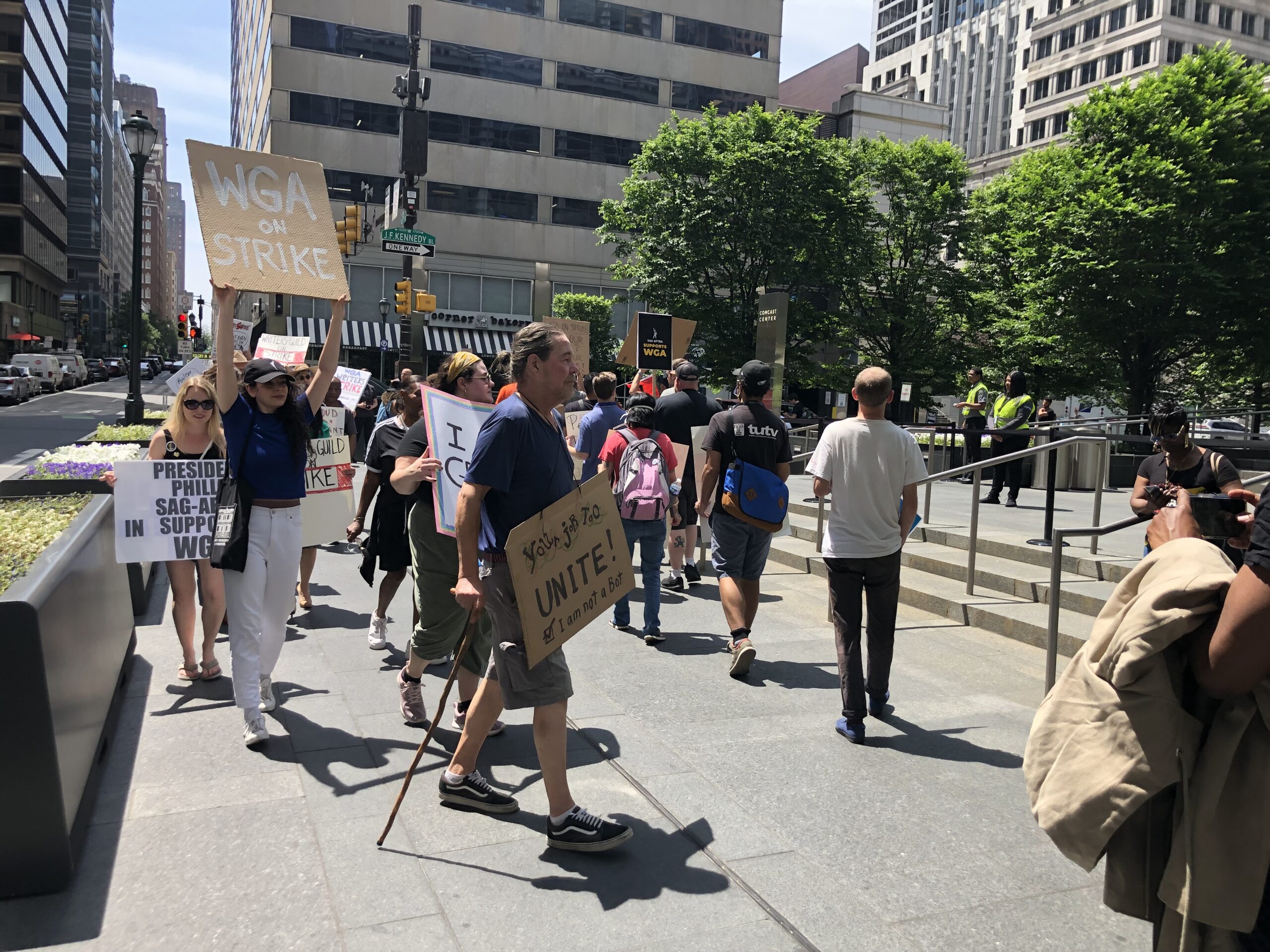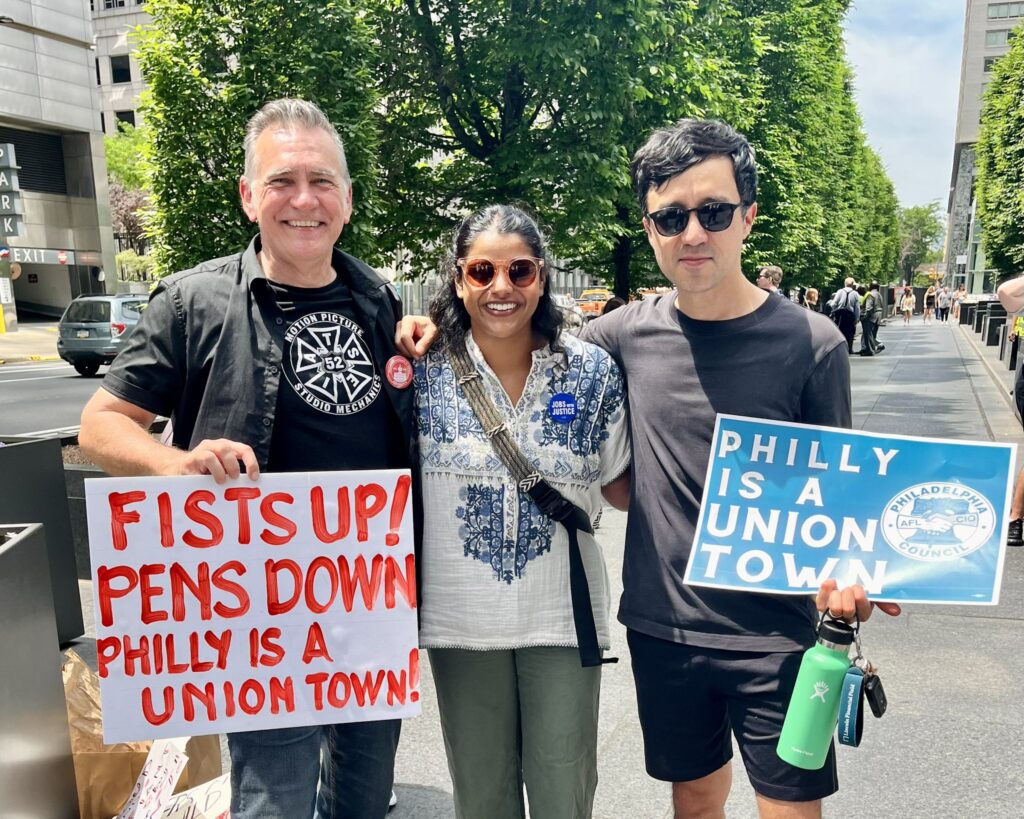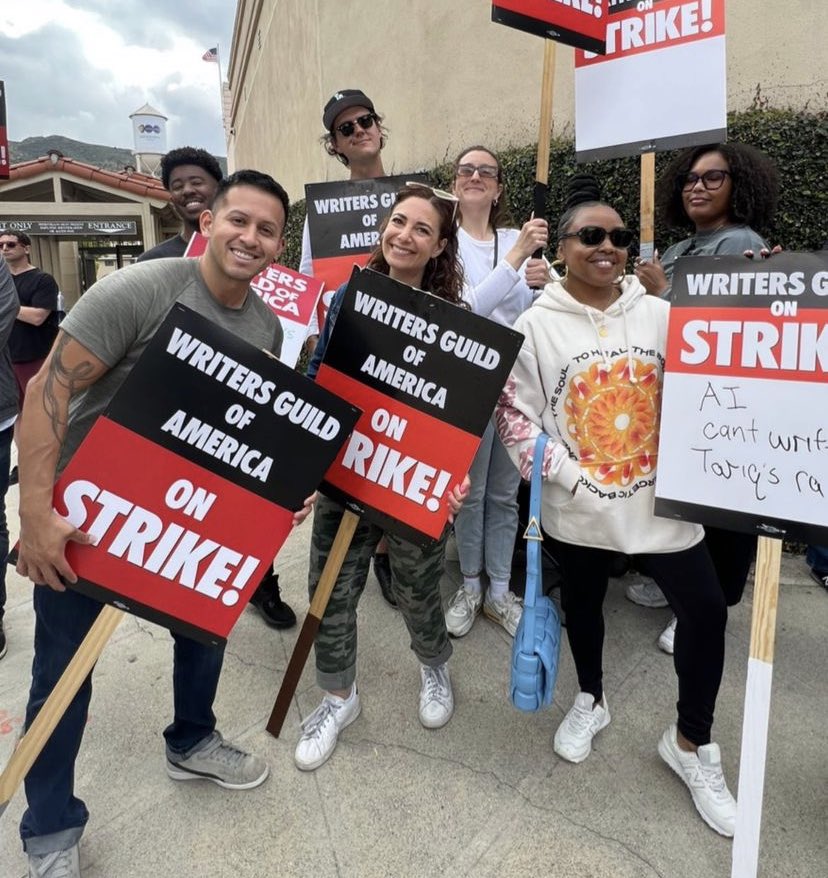
01 Jun Report On The WGA Strike In Philadelphia
BY C.M. CROCKFORD
On May 12, 2023, Writers Guild of America (WGA) and Screen Actors Guild – American Federation of Television and Radio Artists (SAG-AFTRA) Philadelphia Local union members picketed the looming Comcast Center downtown for three hours with signs and chants in support of the recent writer’s strike launched on May 2. As TV screenwriter Sam Watson pointed out on Twitter, one marching song felt “very Philly” in its blunt, defiant message:
“No one pays us, no one pays us
no one pays us and we care,
we’re from Philly, fuckin’ Philly,
fuckin’ pay us because we care.”
Philadelphia has long been a staunch labor and union stronghold. The first general strike in the United States was held here in 1835 in the struggle for the ten hour work day, and the Knights of Labor, founded in the city, was the first major national industrial union. This doesn’t even cover the March of the Mill Children in 1803, the IWW Local 8 longshoremen, and often militant strikes and protests throughout hundreds of years. In short, there’s a long history of working class labor organizing in the City of Brotherly Love. And while film and television is a much smaller industry in Philly than New York or Los Angeles, the WGA strike has still made an impact here.

Local comedy writer Alison Zeidman said she was surprised at the number of other Philadelphia WGA members she’s recently met. “I think how quickly we found each other and mobilized is a great example of just how resolved we are as a union,” she told me in a direct message. The union is on strike over issues critical to writers in 2023, including hated “mini rooms” (smaller writing staff for shows), wages not in keeping with inflation, lack of diversity, shorter television seasons, and debates over artificial intelligence (A.I.) as a tool for writing scripts. As a result, film and television productions across the United States have been shut down, including a major Apple+ series shot around Philadelphia. (The Greater Philadelphia Film Office was contacted for this story, but chose not to offer a comment at this time.)
The crew of the crime show Sinking Spring, starring Brian Tyree Henry, had filmed in Grays Ferry and Spruce Hill as well as in North Philly neighborhoods. However, on May 9, 2023, local WGA members, as well as members of SAG-AFTRA and International Alliance of Theatrical and Stage Employees (IATSE), picketed the drama’s set. Zeidman said the protest was organized “literally overnight” by writer Shuo Zhang. It worked too–production in Newtown Square ended for the day. Zhang, in a direct message, credited her fellow union members with pulling off the protest: “I think people were really willing to stand with us because we’re all feeling the squeeze.”
According to David McMahon, a worker with IATSE, another big project was also apparently set to begin shooting in the Philadelphia area, but it could be delayed or relocated because of the strike.
One of the most prominent depictions of the city in current pop culture, Abbott Elementary, also shut down their writer’s room after the walkout. But star, show creator, and Philly native Quinta Brunson has been out on the WGA picket lines and tweeting in support of the strike. The writer was even photographed with a sign referencing her series’ characters: “A.I. can’t write Tariq’s raps.”
McMahon said, “While it is unfortunate that we are out of work due to Sinking Spring going on hiatus, we know that there is a unified position developing industry-wide between IATSE members and WGA, SAG-AFTRA, and the Directors Guild.”
Zeidman had similar sentiments about the growing sense among industry workers that they’re fighting for a common goal. “I think the reason we’ve seen so much solidarity across all the major entertainment unions, all over the country, is that everyone understands that issues like A.I., shorter seasons, and low streaming residuals don’t just affect writers,” she said. Actors and production workers certainly are impacted by, among other problems, those streaming residuals bringing in less money than DVD sales as well as recent corporate interest in using artificial intelligence to replicate actors’ likenesses.

Indeed, SAG-AFTRA recently sent out a strike authorization vote to its members–which means pop culture fans may soon see their favorite actors out on the studio picket line alongside WGA scribes. President of SAG-AFTRA Philadelphia Local, Nikki Izanec, certainly supports the current WGA action. She wrote to me in an email, “As a performer myself, as SAG-AFTRA heads into our own TV/theatrical contract negotiation, I’m proud to stand with them in solidarity as we all fight for better industry standards from our negotiating partners. The strike is a loud message that all of us are standing with them to picket and help the WGA in any way within our abilities.”
The major studios, as represented in bargaining by the Alliance of Motion Picture and Television Producers (AMPTP), appear to be in it for the long haul, with ABC, for instance, unveiling a fall schedule dominated by unscripted reality shows. Warner Bros. Discovery CEO David Zaslav absurdly insisted as well that “a love for working” will eventually bring the WGA back to the fold. But none of the Philadelphia-area writers, performers, and workers I spoke to seem to agree, maybe because the situation for them is just that desperate. McMahon wrote, “What should be secure, well-paying careers are being turned into daily gig work that keeps workers desperate and scrambling, while the industry itself is consolidating into fewer and fewer corporations realizing astronomical profits.”
The WGA strike obviously has affected work for film and television crews across the United States and in Philadelphia, but workers seem to have rallied around the guild’s fight. Zeidman told me it’s the studios, after all, who won’t play ball and as a result are shutting down shows and films while depriving union members of income. She states, “The AMPTP refused to negotiate in good faith, so they’ve forced us to this—but we’re grateful to have had IATSE, SAG-AFTRA, and the Teamsters by our side from the very beginning, and together, we will all win.”
*Featured Image: Image of union picketers outside the Comcast Center. Image Credit: David McMahon.

C.M. Crockford is an autistic/ADHD writer and editor who’s been featured in dozens of magazines, journals, and websites. He’s originally from New England but now lives in Philadelphia with his cats.

Sorry, the comment form is closed at this time.